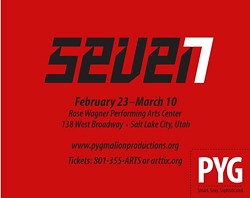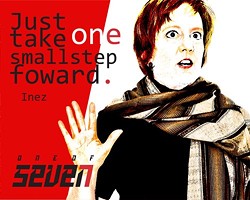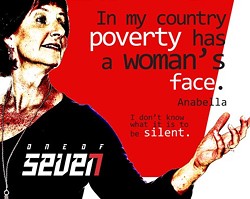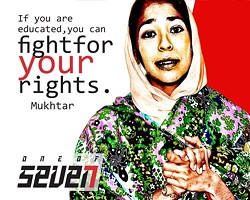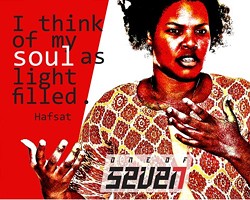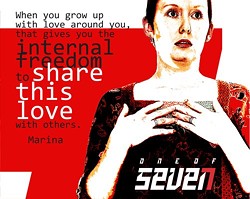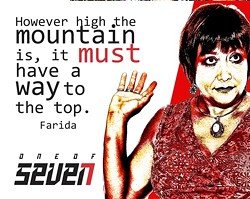Thursday, February 23, 2012
Pygmalion Theatre Company: Seven
Posted By Gavin Sheehan on February 23, 2012, 1:00 PM
The second half of Pygmalion Theatre Company's '11-'12 season kicks off with one of the most prolific documentary productions to come out of the past decade. --- Seven is a composite play from seven different women playwrights who each interviewed women's-rights activists from various countries with some of the harshest laws and treatment of women in the world. The play has earned global attention and praise from figures ranging from high-profile actresses to women in political office. And now that play finds its way to the Rose Wagner this week. Before the play's debut tonight, we chat with the play's director Lane Richins, as well as three of the actresses portraying these playwrights, about the production and their thoughts on the characters and the play itself.
Betsy West, Kerry Lee, Teresa Sanderson & Lane Richins
Gavin: Hey, everyone. First thing, tell us a little bit about yourselves.
Betsy: I have been a working actress in Salt Lake City since the mid-'80s – stage, voice-overs, industrials, wherever I could find work. Now I’m in the corporate world, I work for Alsco Inc.-- a great company, but my heart will always be onstage!
Kerry: I’m Kerry Shimizu Lee of Japanese descent -- both sides of the family -- immigrants from Japan before WWII. I’ve spent most of my life in Utah and received two degrees from the University of Utah: BFA in Modern Dance and an MFA in Theater with an emphasis in Children’s Theater. I also have an MFA in Contemporary Performance from Naropa University, and spent a year training at the Actors Studio Drama School in New York.
Teresa: I am on the board for PYGmalion, so I read the script last year as we were working to build our season. If I am being totally honest, I wasn't as crazy about the script as Lane was. I thought the subject matter was very heavy and wondered how it would play. But Lane's passion for the piece made me take a fresh look at it. He made me a believer. And I must say, while working on the script, I have found much joy and humor in these women's stories.
Lane: I’ve been acting around the valley for a dozen years or so. I’ve performed in one way or another for Pygmalion Productions, Salt Lake Acting Company, Plan-B, Sundance, The Grand, and others. In 2008, I became artistic director for Utah Theatre Artists’ Company. That’s when I began directing. In my two years with that company, I directed Burn This, The Turn of the Screw, I Ought to Be in Pictures, Two Across and others. In 2010, I left UTAC and, later that year, joined the board of Pygmalion. For Pygmalion, I directed The Mysterious, Happy Life of Brown Bag, winner of the 2011 Best Play and Best Production awards at the Page-To-Stage Festival, produced by Wasatch Theatre Company. Most recently, I directed The Sunshine Boys for Pinnacle Acting Company. My next project is directing Chapter Two for Wasatch, opening May 4.
Gavin: How did each of you become involved with theater and what projects have you all worked on in the past year?
Kerry: I had not trained as an actor but found myself continually cast as a performer in musicals and plays while I was at the University of Utah. I performed at Pioneer Memorial Theatre on the main stage and with SLAC -- Salt Lake Acting Company. I was offered an internship with a children’s theater company in Sunnyvale, California and ended up working in the San Francisco Bay Area for many years. The highlights for me as an actor were working with theater companies that did works by Amy Tan; one was the West Coast premiere of The Joy Luck Club. Amy Tan’s book was turned into a stage play after the success of the movie. I was also cast by a San Francisco theater company called Word For Word. They turn works of literature into theater “word for word.” If a word is written, it is said by an actor on stage. Amy Tan's short story Immortal Heart was performed in this way as a play. That particular show did so well in San Francisco that it was revived and the original cast toured for three weeks in France. This short story was the basis for her best-selling book and recent opera, The Bonesetter’s Daughter. My most recent work had been my own performance piece written, produced and entitled Ma Vie En Role. I featured a small live cast, with film media, live music, video, projection, original music and sound. It was a project born out of my exploration of what it is to be a nerd, my introduction to RPG -- role-playing games -- and what it means to be dyslexic or diagnosed with Aspberger's Syndrome. Embodied Poetics was a performance collaboration using the original writing from faculty and students from the Jack Kerouac of the School of Disembodied Poetics at Naropa University. We physicalized the poetry chosen by department chair, Junior Burke. It was up to us to turn poetry into performance using different techniques of collaboration as performing artists. Works from Ann Waldham -- a contemporary of Allen Ginsberg -- Bhanu Kapil, Lisa Burman and others came to life for audiences in a spring showcase using movement, spoken words and song. And I’ll throw in a mention that I was in a showing of scenes chosen from King Lear directed by Stephen Wangh, New York director and teacher of Grotowski. It was unconventional in that the actors were cast in more than one role. It also crossed age and gender lines. I was cast as King Lear and Edmund. It was exhilarating to tackle such a complex work and do scenes as one of Shakespeare’s most tragic characters.
Betsy: I started out as a dancer. I was a modern-dance major, musical-theater emphasis, at the University of Utah, where I received my BFA. From there, I branched out into all types of performance. The last production I was in was Well for Pygmalion Productions at about this time last year.
Gavin: Lane, how did you first come across Seven and what were your thoughts on it?
Lane: One of the women presented in the show is Mukhtar Mai. I’d been following her story since about 2003 or so. She is a member of the Gujar tribe in Pakistan. In short, her brother was accused of having sex with a girl in a higher caste than his, the Mastoi tribe. As punishment, the Mastoi elders took their revenge by gang raping Mukhtar on the dirt floor of a stable. Rather than commit suicide after this tragic event, she decided to fight these men in court, and won. They were all sentenced to death. This event stuck in my mind for many years. Then, in April of last year, I ran across another article about Mukhtar. The men who raped her were having their sentences commuted. All but one were released. This article led me to the Website of Vital Voices, an international organization started by Hillary Clinton and Madeleine Albright in the late '90s. In 2006, this organization hired seven playwrights to interview seven women from around the world who have overcome great adversity to create change in their communities, one of whom is Mukhtar Mai. These interviews became the play Seven. I was haunted for days after reading it. I couldn’t shake it off my mind. It brought my own personal ignorance into clear focus. I felt, almost immediately, an obligation to get this play out there. I’m glad I did.
Gavin: What made you decide to take the director gig for this production at PYG?
Lane: I’m on the board of Pygmalion. Our mission statement is theater from a female perspective. As soon as I became aware of Seven, I knew PYG was the perfect company to produce this show. I started pitching it to board members, and, ultimately, it was selected to be part of the season. I couldn’t imagine handing this show to someone else to direct, it was already starting to live in me. So, I put my name out there, and they agreed. And here we are.
Gavin: Considering each of the playwrights involved with the structure and writing of the play, what kind of challenge was it for you as a director to keep the theme while still defining each of their contributions?
Lane: This is a documentary play. It is written to be a reading. I think we are the first company to present it as a fully staged mainstage production. So, it was a challenge to keep it theatrically engaging while staying true to the words of these women. I always say keep things simple. The most important thing is to tell the story. So that was our main focus. As far as staging, I knew I wanted to experiment with depth, shadows, and movement. So, we incorporated some of those elements and went from there.
Gavin: Teresa, Betsy and Kerry, how did you first find out about the play, and what were your thoughts after reading it?
Betsy: I read the play for the first time in preparation for the audition. I had never heard of it before. To be honest, I had mixed feelings about the play after first reading it. I was concerned that it might be a bit heavy-handed. The stories are pretty difficult to read/hear. Another part of me thought that we’d be preaching to the choir. Generally speaking, I feel that most people who attend theater are pretty aware of what’s going on in the world and are horrified by the injustices about which we talk. Now that I’ve dug deeper into the stories, and with Lane’s guidance, we’re mining the humor in the piece. We’re finding the lightness in the darkness. I think we all need to be reminded how lucky we are to have the safety and freedoms that we do. Hopefully, it’s inspired me to be a part of the change, as well.
Kerry: I received the call this summer from a friend. I’ve been out of the theater loop in Utah for a number of years. So bear with this story, it does connect. In 2006, I was in a film produced in Utah called American Pastime, a fictionalized account of a WWII Japanese internment camps in Utah. It was a movie role that came as a surprise. The casting was taking place in California; the producers told me they had been working on the project for five years. The director, who also wrote the script, told me they hadn’t found anyone until someone referred me in Utah. Luckily for me, someone from the JACL -- Japanese American Citizens League of Utah -- called my friend, who contacted me. I was cast in my first movie as the wife of the character played by local celebrity Big Budah, of Fox 13 News. This film is near-and-dear to me because my uncle, Ted Shimizu, who is still living, was part of the 442nd Infantry Regiment, a battalion comprised of only Japanese Americans in WWII. This most highly decorated unit in U.S. history is given a recognition in this film. My uncle is interviewed as part of the bonus scenes on the DVD. My movie story is connected to my involvement with Seven the play because that same friend called and arranged an audition for me with Lane Richins and Pygmalion Productions. I guess you could say knowing my good friend Laura Olson is good for my career in Utah. I was amazed with the concept of the play, and of all the playwrights, I knew the most about Anna Deavere Smith’s work. Just going to the Website for Seven, the play and the Website Vital Voices were a revelation. I thought about human rights in a philosophical way but not in an internalized empathetic, feeling way. It touched me emotionally to hear those who are voiceless in society given a voice through these women -- their work of reaching children, women and men in war and poverty, people who comprise most of the planet, yet have the least say in what happens in the world.
Teresa: I auditioned because I really want to work with Lane as a director. Wasn't sure where I would fit, but I am thrilled I ended up with this character. She is a real spitfire and I related to her immediately.
Gavin: What was it like for each of you during auditions and then eventually getting your parts?
Kerry: I did not think I had a chance when I walked in the room. I do not focus on work that is in conventional play form, and when I went in to read for Lane my cold reading skills were, well, out of practice. What I liked was that he is reaching for a particular way of presenting the work that is touching without being didactic. The true words of these women are powerful just as they are. And the deceptively simple presentation is something that I’m finding takes work to get past my own opinions of what I’m saying to present them with a clear and interesting voice.
Teresa: The play is mostly monologues, so those moments when we are onstage together are my favorites.
Betsy: I connected right away with the humor of my character, Inez McCormack, who is from Northern Ireland. Lane created a very open and playful environment at the audition. It almost felt like a first rehearsal -- more like “playing” than auditioning, which is a rare treat. All the women were very open and supportive of each other.
Gavin: How has it been for you each of you coming into your roles and interacting with each other?
Teresa: I have really fallen in love with Annabelle de Leon, she really is a force. Born in the very poorest part of Guatemala, she lived in a one-room shack with her mother and brother. She knew from a young age she didn't want to spend her life like that. She took her education very seriously and saw it as a way out of the poverty she was born to. She won a scholarship to a private university where she studied law. She practiced law, then went on to become a congresswoman, one of 14. She is also quite a well known singer in Guatemala, and is very theatrical.
Betsy: The Internet is a beautiful thing! There is so much material available to help with research. I can actually see and hear the real Inez! I don’t want to mimic her, but I can, hopefully, capture her spirit. What an amazing and diverse group of actors are in this play. We have a wide range of ages, experience, and ethic background. Rehearsals have been wonderfully collaborative, playful, and supportive. We laugh a lot!
Kerry: It is a new experience and intimidating to be working with such accomplished local talent. However, the actresses are as warm and inviting as the women they portray. As actors, it is important to find generous players to share the stage, and, again, the simplicity of the presentation requires a real connection with the other actresses so these rather blunt and difficult stories are embracing and not off-putting.
Gavin: Considering the subject matter of the play, how has this production affected each of you and what has stuck with you the most?
Kerry: It clarifies the reality of how the majority of women, children and men who are perceived as “less than” are treated as individuals in this world. Actually, they are not treated as individuals. It is easier for governments to treat groups of people with mandates that don’t address the actual needs of the community. At the moment, it is defined by prejudice, habit and tradition.
Lane: It’s true this play deals with some incredibly difficult issues: rape, sex trafficking, domestic violence, suicide, murder, equality in workers rights, civil rights, political rights -- I think these issues are always important. They should be looked at, they need to be faced. But here’s why I think this play is truly important. It isn’t about adversity, or tragedy, or hardship. It’s about the empowerment that comes through that adversity, that buoyancy of hope that exists within all of us. It is this triumph of spirit that kept these women afloat and gave them the courage to return to the places of their personal tragedies, and create change, make a difference. This play is full of light and hope and that is why it is important. We all need more of that.
Betsy: I’m struck by how brave these women are. Not everyone has the emotional strength to fight injustice. It sounds so cliché, but one person can make a difference. As Inez says, “Just take one small step forward. The first step is the massive one."
Teresa: I guess the thing that sticks with me are these women's journeys, where they came from and where they are now. It is amazing what they have accomplished. It makes me want to do more in my own life to help others. I am excited to share this piece with the public. We take so much for granted in this country.
Gavin: What are your thoughts going into opening night?
Betsy: I can’t wait to share these stories with an audience. They are going to get to know the most amazing women who are doing such good work in the world.
Kerry: My thoughts are about the lines. I’ve been diagnosed as dyslexic; when I learn my lines, I have my own creative way of working on them. My training has included Strassberg, Stanislavsky, a little Meisner and Grotowski acting techniques. When it comes to learning the lines, it is about whatever works. Nerves always change the best-laid plans. And when it comes to portraying these impressive women, I can only hope that my training and instincts kick in and I can embody the story I’m telling of this unique individual, Mu Sochua -- most people would have given up having lost everything and everybody -- by embracing her spirited belief in justice and finding a way to help the people of her country recover by becoming a humanitarian. Mu herself has said in interviews she is a politician, but people have told her not to call herself that because politicians can be so hated. Corrupt ones have given the profession a very bad reputation. Mu Sochua has instead become a politician who is working for the people by becoming the representative of the people, which any elected official should be. Sochua even left her government position to take up with the opposition party, a dangerous move. She is changing the status quo by reaching the people. After this play was first produced, Mu has continued to work and put herself in danger. She has fought a fake lawsuit brought against her by the prime minister of the country in the corrupt courts of Cambodia and lost. She refuses to pay the hefty ruling and has risked imprisonment upon return to Cambodia. As of January of this year, Mu Sochua has returned to Cambodia, and the courts took the ruling, approximately $6000 plus, out of her paycheck to pay the prime minister, with the rest as a fine. Mu knows the court system is used as a political tool. She has already had two appeals for diplomatic immunity rejected. She has been told her filing must be given to the prosecutor in person. He has never been available. Mu has pointed out that poor people traveling from long distances must file in person and they have no recourse if the person they need to see is out. By standing up, speaking out and challenging the system, Mu Sochua has brought to light all that is wrong with the government of Cambodia and continues to work to change it by incrementally replacing it with a system that works for the people.
Gavin: What can we expect from all of you over the rest of the year?
Kerry: To keep doing the actor's job of auditioning and looking for great people to collaborate with and interesting projects to work on. I’ve been encouraged by a playwright friend to really focus on writing. And my goal is to look at re-staging my last performance work. I had planned to do an observership with a theater company based in Portland, Oregon. The times coincided with doing this play. I made the choice to be part of this performance, so I will catch up with that theater company and look at the work they are doing in creative and site-specific performance later this year. I occasionally work with children and young adults in California as a theater teacher and consultant. I met a like-minded director of a high school theater program and she mentioned the idea of creating a theater company. My focus is children and young adults, and my intentions are to produce original work that is reaching beyond conventional plays and performances. I strive to find new ways to be creative, and now I’m looking for the actors, technicians, children, adults, friends and acquaintances to find new and interesting ways to play with the creative spark.
Betsy: I will be doing a couple of fundraisers for Equality Utah. I guess that’s my way of giving back.
Gavin: Aside from the obvious, is there anything you'd like to promote or plug?
Lane: The Crucible, presented by The Grand, opening March 9. Ring of Fire, presented by Dark Horse Theatre Company, opening March 16. In The Next Room, presented by Pygmalion Productions, opening May 3. Chapter Two, presented by Wasatch Theatre Company, opening May 3. Betrayal, presented by Pinnacle Acting Company, opening May 3. And At The Zoo, presented by the Hive Theatre Company, opening June 8!
Teresa: Next for me is In The Next Room for PYGmalion. Next season, I will be directing Lady Day for PYGmalion. I'm also acting in several productions; some haven't been announced yet, so just keep your eyes open.
Kerry: I perform with a drum group called Kenshin Taiko. Taiko is a style of drumming that came out of Japan and is rapidly gaining worldwide popularity. Our group has existed over 30 years and performs year-round at various functions and festivals in the Utah Valley. We received a grant to record and post online -- how we build our own Taiko drums. Currently, I’m learning to build a drum from scratch, doing all the steps myself, with help from fellow performers. These gorgeous drums have voices as individual as the artists who play them. We also learn and perform new works that are not just about playing drums but are also choreographed performances. Taiko is about energy and community. We love to have people interested in learning how to play Taiko come and play the drums with us. Instruction is free and you can find us at the Japanese Church of Christ every Monday and Friday. Beginner lessons start at 6 p.m. You can call Laura Olson at (801) 755-1706 for more information about classes or our upcoming performances. We also book shows for events. Next month, we will be playing for a wedding. Our group is nonprofit and we are available for school assemblies at minimal costs to cover our travel expenses. We list on Facebook and YouTube as Kenshin Taiko. Or you can talk to me after any of the Seven performances at the Rose Gardner. I would enjoy meeting you and talking about our Taiko group. The other plug I’d like to give is for all the recent Asian festivals in and around Salt Lake City and the University of Utah International Night. We were part of the Disaster Relief Benefit Concert for Japan held at Libby Gardner Hall, U of U School of Music This last Saturday, we played at the UVU Third Annual Japan Cultural Night. Utah State had a night called "Tip Toe Into Asia." In the fall, there is the Japanese Buddhist Church, Obon Festiva, Japanese Christian Church, Akimatsuri --Fall Festival, Nihonmatsuri --Japanese Festival in April, the Asian Festival at the South Town Expo Center, as well as many events sponsored by the South Asian Communities, Chinese, Japanese and Vietnamese Business Associations. Just check the community calendars. Many events are free admission, free entertainment and authentic cuisine and arts. If you see our group playing Taiko, just come and talk to us after the show.
| Follow Gavin's Underground: |
On Topic...
-
Film Reviews: New Releases for April 12
Civil War, Escape from Germany, Coup de Chance, Hundreds of Beavers, La Chimera, Sting
- Apr 11, 2024
-
Film Reviews: New Releases for April 5
Monkey Man, The First Omen, Wicked Little Letters, Girls State, Scoop, Exhuma
- Apr 4, 2024
-
Music Plus: March 29
Das Energi Festival headliners, Ogden Twilight lineup
- Mar 29, 2024
- More Gavin's Underground » More Culture »
More by Gavin Sheehan
-
Gavin's Underground: End Of An Era
Nine and a half years of local entertainment blogging comes to an end.
- May 26, 2017
-
Torris Fairley
A quick interview with the up-and-coming SLC-based comedian.
- May 25, 2017
-
Cirque Asylum
A look into the dance school teaching unique forms of aerial arts.
- May 24, 2017
- More »



